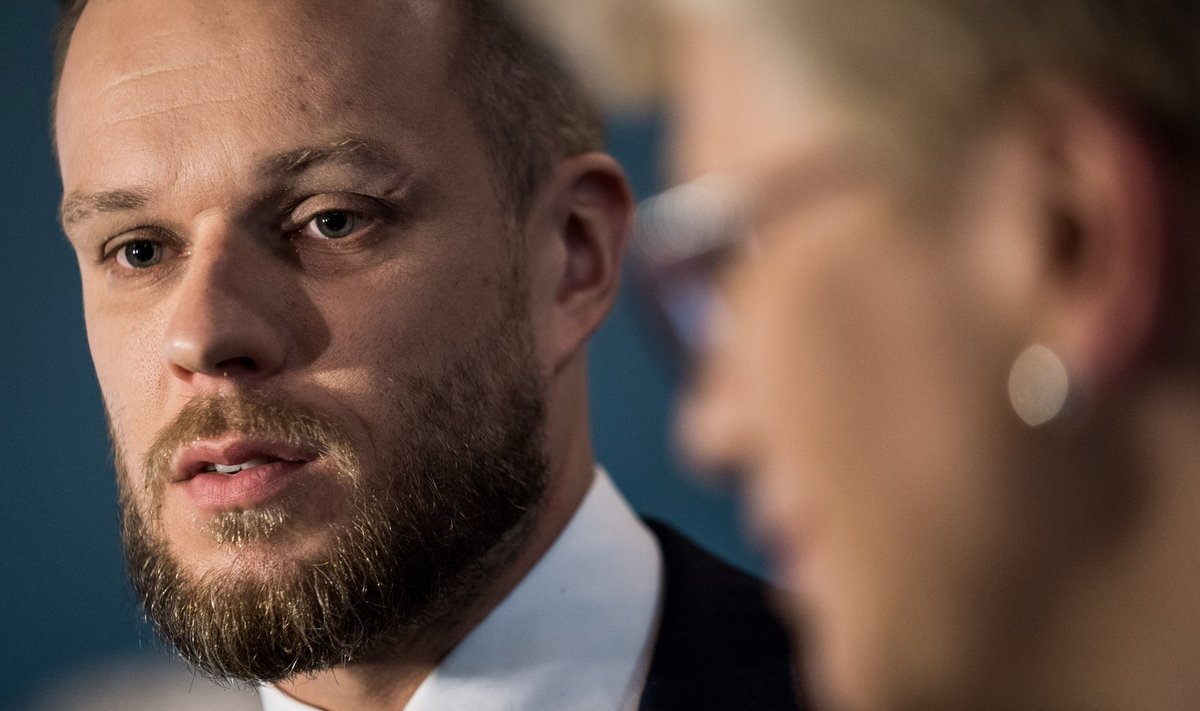"If it is decided, or more precisely, if there is a need, if the numbers do not fall and the public fail to come to the understanding that the situation has to be taken seriously, then the Seimas could be asked to impose additional restrictions," Landsbergis, the chairman of the conservative Homeland Union–Lithuanian Christian Democrats, the biggest party in the parliament, said in an interview with BNS.
The government has made a plea to people to limit their contacts to slow the spread of the virus and prevent the health care system from getting overwhelmed, but if that is not enough, a state of emergency would allow imposing stricter movement controls, he said.
Landsbergis also answered questions about Lithuania's foreign policy goals during his one-hour-long interview with BNS.
– Let me start with the coronavirus situation. In what scenario and what restrictions could be introduced in Lithuania in a state of emergency?
– A state of emergency gives us more instruments. Prime Minister Ingrida Simonyte has said that the current restrictions are a polite request. The government has appealed to people asking for understanding and warning them that the situation is very threatening. Our healthcare system is practically above the limit of overheating already. The heath minister has confirmed these facts, saying that only a week could be left – not much time before a complete shutdown. A state of emergency turns that polite warning into an obligation, enabling the government to enforce the stay-at-home order more strictly and take other measures if it is not obeyed.
– The decisions were announced on Sunday. On Monday and Tuesday, we saw supermarkets full of people and heavy traffic on highways. Did you take into consideration the risk that people might flood shopping centers during the transition period or try to travel to where they would not be able to get to under the new rules in place since Wednesday?
– The issue was raised and there was a discussion with the experts. However, it was decided that it would take several days to prepare, both for the government and for the police, and to warn all institutions. The restrictions are quite strict; there are many of them; they cover many areas. Apparently, it was decided that there was not an off/on switch to turn most of the economy (and) public life off. It was decided that perhaps that damage to the health system and to people's health would be even greater if chaos were created by putting the decision into effect immediately at midnight.
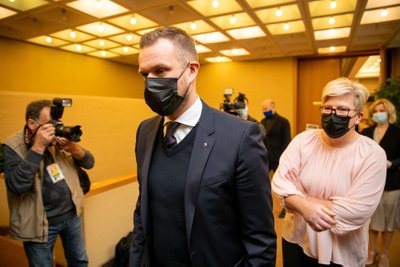
– Let's talk about foreign policy. In principle, what will you do differently than Linas Linkevicius did?
– To begin with, Lithuania's foreign policy is based on consensus, and no big leaps should be expected between elections. Foreign policy is not moving in leaps and bounds, but in a certain chosen direction at a low speed. That means that the fundamental principles – the transatlantic partnership (and) good relations with neighbors that respect the rule of law – remain in place. So does our approach to the threats we continue to face – to our neighbors to the east and (countries) further to the east.
The key difference in what we can do is that we can name what we aim for in foreign policy. My understanding is that Lithuania's voice must be heard. In other words, possibilities for Lithuania's influence in foreign policy lie in proposing change, being heard and seeing that change. We need coalitions; we need friends; we need bilateral friends; and perhaps we can look for these friends where we have not seen the opportunity to do so before. We can expand the circle of friends and not focus so strongly and so directly on our relations with states where we see a threat. A common question – maybe you will have that question, too – is what our relationship with Russia is, whether it will change further and whether there will be some new developments. Let's have our answer to this question. I don’t think one needs an answer when nothing changes. We can have a much stronger policy, for example, toward the future-to-be democratization process in Belarus (and) the revitalization of the Eastern Partnership. We can even turn a new page of policy when it comes to East Asian states, instead of trying to polish a very precise relationship with those states that pose national security challenges.
– I would like you to elaborate. You said that good relations with neighbors who respect the rule of law are important to you. Does Poland respect the rule of law today?
– I did not mean Poland when I spoke about the rule of law; I meant primarily the Belarussian regime. The EU is a union of democratic states. That is our fundamental premise. And the border that lies east of us is very clear. Sometimes we wonder if there are similarities –perhaps Hungary whose decisions can sometimes resemble the principles of a state that is not necessarily democratic. However, we understand that the border to the east demarcates a fairly marked cultural change. Lithuania is part of the union of democratic states and (...) contributes to making it stronger.
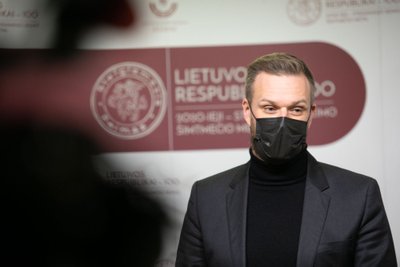
– Still, I am going to ask you about Poland again. The European Commission says the Polish government violates the independence of the judiciary, the media and non-governmental organizations. The Polish authorities categorically disagree with that. Which side do you think is right?
– I wouldn't like to be an arbiter between the EU and Poland. We, as close friends of Poland, are following the situation and are sometimes following it with concern, and I am not saying that we should be happy with all the news that reaches us from Warsaw. But this does not change the key, fundamental principle that Poland is nevertheless our closest friend. The strategic partnership that has been built for centuries cannot be scaled down into a different relationship in a year or even a decade. We are bound by more than just day-by-day politics; our historical relationship and spiritual ties are much deeper, coming from the depths of history. That relationship is based on mutual responsibility for preserving, protecting and nurturing it, but this does not mean that we should not see that certain challenges sometimes emerge in one or another state.
– If you are faced with a choice and have to make a decision about how to reconcile the fostering of European values with good relations with Poland when voting in the EU Council on possible sanctions against Poland, how will you vote – for, against or abstain?
– Perhaps your question would have sounded sharper if the EU had not proven its ability to overcome challenges by compromise. A compromise that was found a few days ago helped both Brussels and Poland to come to the right compromise on the issue of the rule of law that worked for both sides. States will now have access to the Recovery Fund. It seems to me that we need to understand the fundamental principle, which is that the EU is an alliance based on compromise. Sometimes the headlines show us, as was in the case of Brexit or on the Polish issue, that the discussion is heating up to red hot – the red-hot iron even hisses – but then the morning comes and it turns out that the institution that respects each of the parties involved in the discussion finds a compromise. Everyone emerges (from the talks) having lost a little, but more or less satisfied with the overall result. I rely on that because I believe in an EU that is based on compromise.
– In your answer to the introductory question, you mentioned support for a democratic Belarus. Belarusian opposition leader Svetlana Tikhanovskaya is calling for sanctions against Belaruskali, Belarus' fertilizer company that is important for the port of Klaipeda. Do you intend to initiate the inclusion of Belaruskali in the European sanctions list?
– The third package of sanctions is now being finalized; Lithuania has actively participated in the preparation of the list. I think we will not draw up this list unilaterally in the future either, but we will take a really active part in seeking agreement in the EU (...). There is some talk now about a fourth package of sanctions if the situation in Belarus does not change. At this stage, could I say something about one or another specific company? It’s probably too early. When we open a new round of talks, it’ll be clearer what companies we can talk about.

– What are the key criteria that would determine your decision? What economic damage would be acceptable to Lithuania if it meant punishing the Alexander Lukashenko regime?
– First of all, we must look at what effect we are striving for. In my opinion, all the instruments that restrict the right of individuals to enter the EU must be used. The European lists are now, to put it mildly, small in scope; I think they could be expanded. The same holds true for the financial resources these individuals have in the EU and in Lithuania. We must not stop at introducing sanctions and leaving it to member states themselves to find out whether or not they have these resources in their country.
I am urging our financial institutions – if they have not done so already – to simply check whether those on the sanctions lists have any financial resources in Lithuania. Likewise, Lithuania can turn to other member states with the same question, so that these sanctions do not remain only on paper (...), but become a functioning instrument that actually changes behavior so that people in Minsk who take decision to use force against peaceful protesters understand that the sanctions are not toothless.
– Have you already contacted other public authorities about asset freezes on blacklisted Belarusian citizens?
– This is one of the first things I am going to do. Since civil society is engaged in this, too, several meetings have now been scheduled with representatives of the Belarusian opposition who are in Vilnius. We will ask them what they know (...); perhaps there is some additional information. I'm convinced that European sanctions are working effectively (...), but I'd like to know how they work and how this is done and by what institutions, because commercial banks that hold these resources must be involved, too. So, I will do that without delay.
– To your knowledge, are there any Belarusian citizens whose assets and accounts have been frozen or seized in Lithuania due to blacklisting?
– I have not heard of such a case either in Lithuania or in the EU
– Will you yourself communicate with Belarus' foreign minister?
– At this stage, I don't see much need for that, but if urgent issues emerged, I think there is such a possibility.
– Probably one of the urgent issues would be the return of the Lithuanian ambassador to Minsk. Isn't this a sufficient reason to try to resolve this issue at the ministerial level?
– I'm not sure the ambassador should return to Minsk.
– What is your position?
– My position is that in a tense situation, the ambassador may stay in Vilnius for consultations, and the embassy may be headed by someone who has not presented their credentials to an illegitimate head of state, which is what Alexander Lukashenko is now.
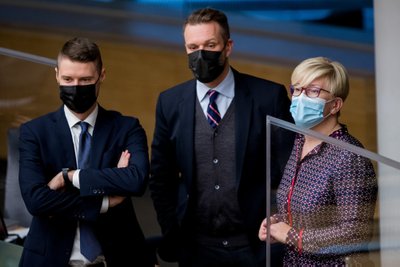
– The Lithuanian ambassador returned and the diplomatic staff at the embassy was reduced at the Belarusian side's request. Is it now Lithuania's position, too, that diplomatic representation can take place at a lower level than that of ambassadors?
– Yes, in principle, I believe that it can remain below the level of the ambassador at this stage, and I see no reason for much change now.
– Won't this prevent Lithuania from recording the situation in Belarus and helping Belarusian civil society there? The embassy is actively providing assistance, including logistical support.
– I trust the staff of the embassy; I trust the people in charge of the processes there now. I think their efforts are sufficient for now.
– What will be your strategy regarding the Astravyets nuclear power plant?
– The principled position with which we ran in the election and which was written both into the coalition agreement and in the government's program is that there can be no commercial trade in Astravyets electricity. Our goal now, I mean both in the diplomatic service and the Energy Ministry, is to ensure that the documents regulating trade and electricity supply are in line with this provision; in other words, that Lithuanian infrastructure, (power transmission) lines and electricity storage instruments are not used to store commercial energy from Astravyets. An alternative methodology has been worked out for this; we will try to convince the (other two) Baltic states to approve our proposal.
– What are the important points in the methodology that differ from the methodology agreed by Latvia, Estonia and former Energy Minister Zygimantas Vaiciunas.
– The key point is that Latvia that has a flow from Russia should trade electricity that comes to it from Russia on its power exchange. This is its legitimate demand. However, electricity coming through Lithuania would basically be only that of Astravyets. The previous methodology made it possible to trade a considerable part of the technical flow of electricity coming through Lithuania to Latvia on the exchange. What we seek is to limit trade on the exchange to volumes that come via channels other than through Lithuania.
– Have you already presented this proposal to Latvians?
– I can't say for the Energy Ministry. I haven’t had that opportunity yet.
– In the coalition agreement, you committed to defending those fighting for freedom, I'll quote, "from Belarus to Taiwan". Why the government program no longer contains the reference to Taiwan?
– It’s a value-based position. We have agreed with the coalition partners that value-based issues that are important for the coalition partners, the majority of them will be decided at the Seimas level, be it partnership-related issues, or some other issues. We have to bear in mind that the Seimas' parliamentary diplomacy might appear in a new light.
– On the Taiwan issue?
– On that issue as well, but speaking in general on wider possibilities to defend values.
– Still, the Taiwan issue might also be part of the government program. The government has received Taiwan's proposal, request to open a representation that would not be equal to an embassy, similar to what they have in Riga. Based on unofficial information, China has warned the Lithuanian government it might lead to serious consequences. What would be your decision? Will Taiwan be able to open its representation in Lithuania?
– I would definitely not rule out such a possibility for the fact that it’s a business representation. If I'm not mistaken, based on the latest data, Lithuania is one of two EU member states that do no have such representations. I would be surprised by any retaliatory measures, they would bear an element of blackmail, which is not necessary acceptable in bilateral relations, especially taking into account the fact that it's already a well-established European diplomatic norm for boosting business relations among member states and Taiwan this way, by opening a representation in a member state or a member state's business representation in Taiwan. I would say this issue might really be included into the government agenda, if not at the initiative of the Ministry of Foreign Affairs, then at the initiative of the Ministry of the Economy and Innovation. But the Ministry of Foreign Affairs would be ready to assist, if such assistance was necessary.
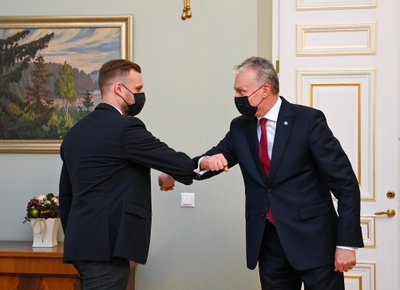
– Please, elaborate on your position on Lithuanian-Chinese relations.
– China's might is growing both in the Asian region and also across the world, and we need to look at how that might is used, what message it is bringing. Whether that is benefit from cooperation, mutually-beneficial friendships and the promotion of good relations, or does it pose some sort of threat. Our partners, especially the United States over the course of the previous administration, have very clearly warned the world that the growing might is a threat both in terms of the national security aspect through cyber issues, and also in terms of commercial leverage. We cannot not to hear this. And during our interview, there was a claim that the opening of a business representation, based on your sources, might lead to some sort of implied sanctions or other instruments, and that means we have relations that might start restricting that space for Lithuania's diplomatic operation, which also reminds us a bit of non-friendly way of acting.
The Ministry of Foreign Affairs should set a clear goal over the upcoming four years I would call strategic diversification. We should reminisce of 1999 when Lithuania was very much dependent on commercial ties with Russia. A crisis lead to economic losses but the lesson was learnt and we had to diversify and we chose trade partners from the West. Those business-economic ties brought us closer to the West.
Today, we see that our links with China might bring certain constraints for us in the long term, and we might feel small and too-constrained. Therefore, we need to look for additional both business and economic possibilities, look for new contacts in the Asian region, new connections, new markets we could bring necessary goods from and also we could export what we consider important for us. We have our embassy in Japan, we have economic connections in one or another country in the region, but we could really bolster that. I believe we could plan opening a diplomatic representation in South Korea we were establishing economic relations with during the story of our Independence vessel. Established connections could be further developed both at the strategic and the economic level through the search for new markets for goods and services for our economic development. We should strengthen our relations with Singapore as well, both administrative and business ties.
Entering the XXI century, Lithuania should not be afraid to see the wide world, and the size of that region, and what it can achieve, being a small but sophisticated and bold country.
– Chinese cargoes play not a very big but certain role in Lithuania's economy, and Lithuania has recently seen an increase in the volumes of Chinese cargoes transported by rail. There are also investments into Lietuvos Pastas (Lithuanian Post) as a certain regional center. How would you define where that red line is in terms of Chinese investments in Lithuania?
– Speaking of strategic investments, we have fairly effective instruments at both the government and parliament level. And when I was in the opposition, questions were regularly raised regarding various state investments, from China and others, into Lithuania's strategic sector. We have a fairly well-operating assessment system on where our national security limits are and where we believe that going beyond those limits would be not good. We control that.
Regarding investments that are not directed into our strategically dangerous sectors, I wouldn’t see major risk as yet. Lithuania is not very much committed to one state as there are EU member states that have developed that bilateral investment format considerably more. But, still, if we do not set any strategic tasks for ourselves and just let everything go, then, naturally, an economy of that size as China's would have a big interest and eventually come and assume positions and then others might have less of that space. A state must diversify its attitude. I see no problem in that as we are not sending any bad or stopping message to one or another state, we just want Lithuania to attract investments from more than one country. That would ensure our national security.
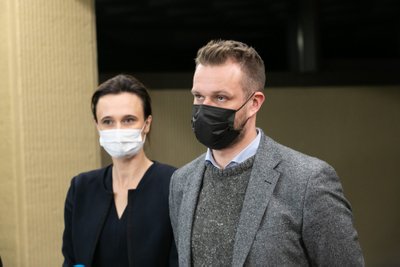
– Can the port of Klaipeda in general have at least some Chinese investment, or that would already be that issue of national security, including potential NATO transit, where you could say that it's a red line already?
– I believe it’s a security issue.
– As China's might is growing and the Unites States is isolating, especially during the Trump administration, but probably not only during it, a lot of people say that without deeper integration the European Union will start losing influence both in terms of international trade and international diplomacy. In what areas, in your opinion, that deeper European integration is possible and which areas should continue remaining within the competence of member states?
– We should look into this issue in a wider sense. In the existing context, post-Brexit and amid the ongoing challenges with our neighbor Poland, more often then not we have headlines on some kind of exit rather than deeper integration. Questions start arising on whether a state that's now in dispute over one or another issue would not inadvertently follow the path of Britain, would not call a referendum and so on and so forth. We see the process of disintegration in some areas and that is raising concern. Despite the fact that countries manage to reach consensus and a lot of energy and effort go into it, sometimes I hear a nervous reaction from the European Union, from representatives of the Brussels institutions, major countries shaping the line in the EU integration that "well, whether so much effort is worth it, trying to keep that whole project together".
And here Lithuania should ask itself a question. There have been many questions when we were presenting out government program and said that if some disintegration processes happen and the European Union was choosing which way to go, Lithuania should remain in favor of integration and synergy in a responsible nucleus. In other words, certain risks do exist in the future and we see them. Nevertheless, Lithuania should say that there will be no "Litexit" and that we are part of the European Union, we consciously chose this project, we are an integral part of it and we want to take part in it with all our energy. Such a pro-European line should be confirmed. That's a fundamental stance ensuring Lithuania's both economic and national security.
There are constant discussions on whether we now should speak about some sort of deeper integration in certain areas. Still, I see certain potential divergence in values as the European Union stands at a crossroads and is deciding which way to go – to stay together and try to defend our value-based continent by withstanding pressure from new and rising powers and maintaining our partnership with our natural transatlantic partners, or to try and do something independently, which Great Britain proposed. I believe Lithuania should say very clearly that Lithuania is a pro-European country defending the common project.
– You have vowed to depoliticize the diplomatic service. What specific steps are you going to take to do that?
– A clause was included into the law on the diplomatic service and has been in force for a long time that the minister has the right to grant a rank to anyone the minister wants without the approval of the attestation commission and without any possibility of major objection. Similarly to the president's right to grant the rank of an ambassador, the minister has the right to grant a rank up to a ministerial adviser. It has created a system when the team of the incoming ministers have expectations to later remain in the system becoming diplomats, ambassadors and get involved in the diplomatic service.
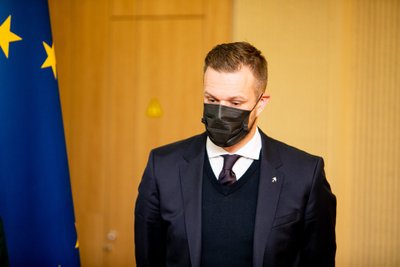
I have been working in the diplomatic service for some time. As a young diplomat starting from the lowest step, I had that feeling of being in a store line when somebody enters the middle of the line with their trolley because they just need it more, especially, if that person represented some political party which was in power at that moment. It would strongly de-motivate already working and incoming diplomats. And later on, when you go up the ladder, the same principle applied. I believe that provision is unnecessary, and there are possibilities to bring in people under temporary contracts in emergency situations and buy expertise services, if we believe that we need some external assistance. But that cutting of the line should stop. I will put forward amendments to eliminate that possibility for me and future ministers.
– The very make-up of the attestation commission is now very politicized as it includes vice ministers and the chancellor. Are you going to change that?
– It might change. I have planned a possibility to propose to the government and the Seimas to open up the attestation commission by, for example, inviting representatives of one or another higher school. If institutions selecting judges have already opened up to the public, I believe we have possibilities to open up the selection process of the diplomatic service.
– President Gitanas Nauseda has confirmed his wish to see Vygandas Jankunas, who is now working for the European Commission, as Lithuania's ambassador to the EU. Will the government nominate this candidate?
– We've not had a discussion with the head of state yet. We will, first, start with conversations, as the law provides. Everything starts from informal conversations, we will hear the names, the arguments, the possibility will come to present one's position. In my opinion, professionalism is the initial criterion, as in any job. The person needs to do the job for the state in the best possible way. If that person does the job for the state, so that's my assessment criterion. We’ll see how that list of ambassadors will be formed.
– Will former Cabinet members Linas Linkevicius and Raimundas Karoblis continue their diplomatic service?
– Regarding Linas Linkevicius, I have signed documents restoring his rank and granting him the possibility to return to the Ministry of Foreign Affairs. I consider him to be one of the most qualified diplomats in Lithuania, despite the fact that we've been on the opposite sides for a fairly long period of time. He's a Lithuanian diplomat of the highest standard. Lithuania would be lucky if he continued working for Lithuania.
– Are there any discussions on Linas Linkevicius' positions within the EU diplomatic service?
– I would see such possibilities but it's too soon to speak about that.
– In your program, you speak of the need for coordinated effort to shape and create Lithuania's historic narrative. Your predecessor Linkevicius would often receive questions during meetings with representatives of Jewish organizations on the memorial plaque for Jonas Noreika – General Vetra in Vilnius, the monument for Juozas Kristaponis in Ukmerge. What would be your answer to those questions? Is such commemoration acceptable?
– We have so far not established any objective historic assessment institution. An international commission for the investigation of Nazi and communist crimes was established under the Andrius Kubilius government. It had the goal of bringing together those historians who were investigating different aspects of "bloodlands", as Timothy Snyder described them, and producing a formal attitude through their debate. I see no other way. If we cannot attract the international community, we have to do it ourselves but also invite people with a different view. Despite that, I have my own attitude, but if politicians shape a historic attitude, that historic attitude or narrative changes after four years. The most painful things are too sensitive to depend on one or another incoming politician. Nevertheless, I want to believe there are possibilities to come together. There's an example in Germany where they have a historic commission under the government and it provides conclusions or can offer a way forward on a complex historic issue. I believe Lithuania needs that very much. Unfortunately, we have seen movement in another direction recently. It’s not productive.
– You would probably agree that some differences of opinion can and will remain. Still, your personal political and moral position is important, therefore. Please, don’t evade the question. What is your position on honoring Jonas Noreika and Juozas Kristaponis in Lithuania?
– I consciously started a longer answer. Your take two figures, and then we are forming a narrative even through the question. They are not similar, they are not identical.
– With no doubt. But those signs of commemoration do exist in Lithuania.
– Regarding the Kristaponis monument, I have no clue why it’s still standing and why it should remain. That issue, in my opinion, should have been resolved a long time ago.
Did the plaque to General Vetra had to be hammered there way it was hammered? I don’t thing it’s a wise thing. Other ways could have been found and they would have not caused such uproar. We had proposed several solutions that that plaque could have been put in some other place or inside that library with an explanation.
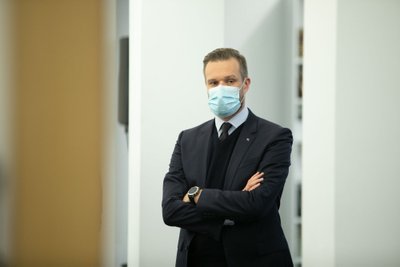
Historic questions are rarely answered with a hammer. We more often need to imagine that these are fragile issues and we should approach them this way. Still, I would also like your question to be more specific so that we don't take everything off the table and place into a one box and name it "Lithuania's history" and put everything into the bin or on the pedestal. Every case is worth being looked into and historians do that in a much more effective way than politicians.
– In your opinion, a commission for the investigation of Nazi and Soviet crimes, established under a presidential decree, would be the best platform?
– When that uproar over General Vetra's memorial plaque broke out, I turned to the president at the time and proposed to him to take charge of the commission. I was and continue being of an opinion that the president's authority would help reestablishing that commission. It involved well-known figures, recognized historians from the US, Germany, Poland, Israel, Lithuania. That commission should be asked difficult questions, and then we all could start our slow process of healing. These are Lithuania's old wounds, and as I understand and feel that pain, I believe a hammer would not help those wounds to heal, but will leave new scars.
